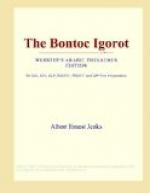To-day friction matches are known throughout the area, although probably not one person in one hundred has ever owned a box of matches.
The fire syringe, common west of Bontoc Province among the Tinguian, is not known in the Bontoc culture area.
Division of labor
Under this title must be grouped all forms of occupations which are considered necessary to the life of the pueblo.
Up to the age of 5 or 6 years Bontoc children do not work. As has been said in a previous chapter, during the months of April and May many little girls from 5 to 10 work and play together for long hours daily gathering a few varieties of wild plants close about the pueblo for food for the pigs. This labor is unnecessary as soon as the camote vines become large enough for gathering. During June and July these same girls gather the camote vines for pig food. About August this labor falls to the women.
Mention has also been made of the fact that during the latter half of April and May the boys and girls of all ages from 6 or 7 years to 13 or 14 guard the palay sementeras against the birds from earliest dawn till heavy twilight.
Little girls often help about the dwelling by paring camotes for the forthcoming meal.
At all times the elder children, both boys and girls, are baby tenders while their parents work.
Man is the sole hunter and warrior, and he alone fishes when traps or snares are employed.
Only men go to the mountains to cut and bring home firewood and lumber for building purposes; widowed women sometimes bring home dead fallen wood found along the trails. Only men construct the various private and public buildings. They alone build the stone dikes of the sementeras and construct the irrigating ditches and dams; they transport to the pueblo most of the harvested palay. They manufacture and vend basi, and prepare the salted meats. They make all weapons, and all implements and utensils for field and household labors. Contrary to a widespread custom among primitive people, as has been noted, the Igorot man constructs all basket work, whether hats, baskets, trays, or ornaments, and bindings of weapons and implements. Men are the workers of all metal and stone. They are the only cargadors, though in the Kiapa area of Benguet Province women sometimes go on the trails as paid burden bearers for Americans.
Only men are said to tattoo and circumcise. They determine the days of rest and of ceremony for the pueblo, and all pueblo ceremonies are in their hands; so also are the ceremonies of the ato — only men are “priests,” except for private household ceremonials.
Men constitute the “control element” of the pueblo. They are the legislative, executive, and judicial power for the pueblo and each ato; they are considered the wisdom of their people, and they alone, it is said, give public advice on important matters.




